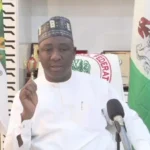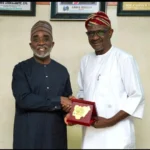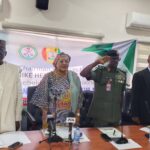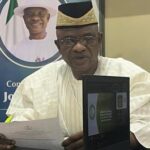By Folasade Akpan, News Agency of Nigeria (NAN)
As Nigeria steadily advances toward Universal Health Coverage (UHC) by 2030, significant health sector reforms are underway, targeting a range of issues from childhood malnutrition to robust investments in Primary Health Care (PHC).
Under the Renewed Hope Agenda, the President Bola Tinubu administration has intensified reforms through strategic frameworks including the National Health Renewal and Investment Initiative (NHRII) and the Sector-Wide Approach (SWAp).
Additionally, the Nigeria Health Sector Renewal Compact has been signed by the Federal Government, all 36 state governments, and development partners.
These efforts aim to harmonise previously fragmented interventions to build a more integrated, efficient, and self-reliant health system.
By Dec. 2024, enrolment in the National Health Insurance Authority (NHIA) had increased by 14 per cent, reaching 19.2 million Nigerians from 16.7 million.
Capitation payments to health providers grew by 93 per cent, while fee-for-service reimbursements, which cover individual medical services, surged by 378 per cent.
This expansion reflects improved access to essential health services and reduced out-of-pocket spending, alongside strategic efforts to enhance service quality.
The Basic Health Care Provision Fund (BHCPF) remains a cornerstone in Nigeria’s UHC journey, designed to promote equity by establishing operational PHC facilities in every political ward, supported by functional secondary healthcare centres in each state.
Over N130 billion has been allocated, with N31 billion disbursed in 2023, N25.8 billion in 2024, and an additional N32.8 billion approved to support more than 8,000 PHC centres.
A landmark achievement is the national rollout of the Human Papilloma Virus (HPV) vaccine on Oct. 24, 2023, targeting girls aged nine to 14, with 14 million girls vaccinated to date.
Dr Muyi Aina, Executive Director of the National Primary Health Care Development Agency, credited this success to the leadership of President Bola Tinubu, the First Lady’s support, and the commitment of ministers and stakeholders.
As of May 30, 2025, the agency was revitalising about 1,100 healthcare facilities, with plans to ensure at least one functional PHC centre per ward by year-end.
To combat high maternal mortality rates, the government identified 174 Local Government Areas responsible for half of maternal deaths and inaugurated the Maternal and Newborn Mortality Reduction Investment Initiative.
Through this, 1,600 women have been treated under the Fistula-Free Programme, and more than 4,000 women have benefited from free Cesarean sections.
At the maiden Joint Annual Review of the health sector in Nov. 2024, Coordinating Minister of Health, Prof. Muhammad Pate, highlighted tangible results from government commitments.
He said data from the Demographic and Health Survey showed a 16.7 per cent reduction in under-five mortality between 2018 and 2023, along with a 40 per cent decline in diarrheal diseases.
Pate said there were also a 24 per cent reduction in tuberculosis cases and a 12 per cent decrease in HIV prevalence during the same period.
He said by the third quarter of 2024, Nigeria had met 31 out of 41 key performance indicators across Presidential Commitments and was on track to surpass all targets for the year.
Pate said under PHC 2.0 reforms, the government emphasised equity by allocating financial and human resources across more than 8,000 PHC centres, with N45 billion disbursed directly to states.
According to Pate, addressing brain drain challenges, 40,000 frontline health workers have been trained toward a target of 120,000.
“Additionally, 17 states showed notable improvement in modern contraceptive usage, with six doubling their efforts.
“Following an Executive Order by President Tinubu, at least 40 businesses submitted proposals to boost local healthcare manufacturing.
“A Memorandum of Understanding with Afreximbank secured 1 billion dollars to finance healthcare, leading to the creation of MediPool.”
MediPool, a Group Purchasing Organisation operating under a Public-Private Partnership (PPP) model, aims to reduce drug costs and boost local pharmaceutical production through strategic bulk purchasing.
It will initially serve BHCPF-supported facilities, which reach more than 37 million Nigerians.
In spite of a global decline in financial aid to Nigeria and other developing nations, the government responded by leveraging domestic resources.
The National Assembly approved an additional N300 billion for the 2025 health budget, underscoring Nigeria’s commitment to sustaining progress.
International recognition of Nigeria’s healthcare reforms came in 2025, when Time Magazine named Prof. Muhammad Pate among the 100 most influential people in health worldwide.
Also honoured were Mrs Ladidi Bako-Aiyegbusi, Director of Nutrition, and Dr Abasi Ene-Obong, a genomics innovator, highlighting the country’s growing impact on global health.
Pate was honoured for revitalising PHC, expanding community health workforces, scaling up maternal and child health services, and promoting local production of health commodities.
Bako-Aiyegbusi was honoured for her leadership in advancing national nutrition policies and systemic food reforms.
In cancer care, Kebbi State Governor’s wife, Dr Zainab Shinkafi-Bagudu noted accelerated progress in the last two years, including the addition of six cancer centres and the vaccination of 14 million girls against cervical cancer.
As President-Elect of the Union for International Cancer Control, she attributed the improvements to renewed investment and stronger budget commitments.
Prof. Adewale Musa-Olomu, immediate past Medical Director of the Federal Medical Centre, Abeokuta, commended President Tinubu for protecting health budgets and promoting tertiary health infrastructure.
He highlighted directives to legislators to avoid cuts to health budgets and allow constituency projects within health institutions, which helped improve infrastructure.
However, significant challenges remain. Dr Happy Adedapo, Chairman of the Nigerian Medical Association in Oyo State, emphasised that health sector funding remained below the 15 per cent target of the Abuja Declaration.
He called for increased budget allocations, better incentives for rural health workers, infrastructure improvements such as steady power supply, and ongoing health worker training.
Public health expert, Dr Adedayo Olabiyi, stressed that sustainability required more than facility upgrades, it demanded enhanced service delivery across all wards.
He urged sustained funding, workforce expansion, reliable data collection, and stronger community engagement.
Olabiyi also highlighted the need to improve health worker retention through better incentives and career development.
Mr John Chigbu, CEO of Cassona Global Imaging Limited, argued that developing medical tourism could stimulate economic investment in health.
He underscored that healthcare should not be a privilege for the wealthy and called for greater corporate and citizen participation to support affordable care.
Consultant nephrologist, Dr Odeyemi Ayola, emphasised the critical role of Public-Private Partnerships in transforming and funding Nigeria’s health system.
He advocated for deeper collaboration among government, private sector, non-governmental organisations, and communities to pool resources and bridge service delivery gaps.
According to Ayola, this synergy will increase healthcare spending, strengthen services, and ensure sustainable access to quality care.
Experts agree that under President Tinubu’s leadership, Nigeria has made significant progress in transforming its healthcare delivery systems over the past two years.
The challenge now is to sustain the gains, shifting focus from merely building infrastructure to ensuring that quality healthcare reaches every Nigerian equitably and resiliently.(NANFeatures)
***If used, please credit the writer and the News Agency of Nigeria.












